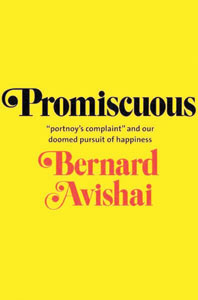 “Promiscuous: ‘Portnoy’s Complaint’ and Our Doomed Pursuit of Happiness,” by Bernard Avishai. (Yale University Press, 2012)
“Promiscuous: ‘Portnoy’s Complaint’ and Our Doomed Pursuit of Happiness,” by Bernard Avishai. (Yale University Press, 2012)
The late 1950s and early 1960s represented a unique chapter in the history of American fiction — the rise of the Jewish writer. Beginning with “Marjorie Morningstar” (1955), which landed its author, Herman Wouk, on the cover of Time, the American Jewish experience dominated American literature. All of this culminated in 1969 with the publication of Philip Roth’s controversial “Portnoy’s Complaint.” Then, suddenly, the bubble burst. Except for Neil Simon, Jewish writers seemed to cater more to a niche market. While many of these writers showed a deeper and more sympathetic understanding of Jewish culture than did their predecessors, they no longer commanded center stage.
When “Portnoy’s Complaint” first appeared it was surrounded by controversy. Some critics saw it simply as obscene. In the words of Gershom Scholem, “This is the book for which all anti-Semites have been praying.” Now, more than 40 years since its publication, we should be able to achieve a more balanced approach. Such is the purpose of Bernard Avishai’s “Promiscuous.”
From the outset, Avishai focuses on something that should have been obvious from the beginning — the ironic distance between Portnoy and Roth: “The caution — that Portnoy was not Roth — was ignored even by more seasoned critics who read novels for a living.” Many readers who assumed that Roth was writing about his own family, for example, have been surprised to learn that Roth, unlike Portnoy, did not have a sister.
For Avishai, who is personally acquainted with Roth and has been able to obtain some first-hand insights, the novel is essentially a satire, and Portnoy himself is the principal object of the satire. Another target of Roth’s satire, Avishai asserts, is psychoanalysis itself: “If you read between the lines — and how can you not? — the uber-objects of Roth’s satire are those very orthodox psychoanalytic expectations, which Portnoy implicitly pays homage to.” Avishai defends Roth against the charge of misogyny, saying “Portnoy does not objectify women until he has objectified himself.”
I wish Avishai had paid more attention to this novel as literary satire, with its implicit critique of the novels of Malamud and Bellow, who placed too much symbolic weight on their Jewish characters. In “The Assistant,” Malamud had treated the Jew as a representative of the prophet Isaiah’s “suffering servant.” For Roth, speaking through Alex Portnoy, such concepts cannot be applied to contemporary Jews.
There are some places where Avishai’s arguments are a bit hard to follow, and there is one incident of nasty lashon hara directed at one of Roth’s detractors which has no place in a book of this type (page 136 if you have the book — otherwise, I don’t want to spread the rumor here). But if you agree that “Portnoy’s Complaint” is a landmark of Jewish-American fiction, then this book is a must read.


